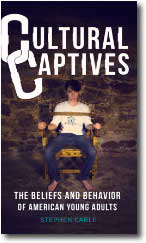This is the first of a series of posts reporting on our analysis of the survey data collected by the World Values Survey project. Surveys were conducted in 57 countries between 2010 and 2014. In all, over 85,000 people were interviewed for these surveys. The survey had fifteen questions directly concerning religious beliefs and practices. But it also had questions in a number of areas that related to how people applied their religious beliefs to cultural and political issues.
I will begin by considering the beliefs and practice of two neighboring countries, Mexico and the United States. The surveys taken in these two countries do not allow us to distinguish between different types of Protestants. There is also no distinction between atheists, agnostics and “nothing at alls”; they only have one choice, “None.” In the table below, the data for Catholics, Protestants, and Nones is presented for each country, for all ages, for those under 30 and for those 60 and older.
| Country | Age | Catholic (%) | Protestant (%) | None (%) |
| Mexico | All | 70 | 10 | 18 |
| Under 30 | 64 | 11 | 23 | |
| 60+ | 82 | 8 | 9 | |
| United States | All | 22 | 41 | 34 |
| Under 30 | 20 | 32 | 43 | |
| 60+ | 26 | 50 | 22 |
As shown, Catholicism is dominant in Mexico, accounting for 70% of the population with the Nones edging out Protestants across all age groups for a weak second place. But we also see significant differences based on age. For those under 30, the percentage of Catholics drops to 64% while the percentage of Nones grows to 23%. For those over 60, we see the opposite, with Catholics garnering 82% while the Nones drop down to only 9%.
In the Unites States, Protestants make up the largest percentage of the total population with 41%. For those 60 and over, that group increases to 50% of the population. Consistent with our posts on other surveys, the under 30 group is very different, showing 32% Protestant and 43% Nones.
Over 60% of the Nones in Mexico state that “God is very important to me,” indicating that they are theistic Nones. In the United States, less than 30% of the Nones would be considered theistic.
Pluralism
One of the questions in the surveys asks if they agree with the following statement: “The only acceptable religion is my religion.” The responses among Protestants and Catholics are as shown in the table below.
| Country | Age | Catholic (%) | Protestant (%) |
| Mexico | All | 45 | 43 |
| Under 30 | 34 | 37 | |
| 60+ | 65 | 63 | |
| United States | All | 17 | 29 |
| Under 30 | 22 | 39 | |
| 60+ | 11 | 15 |
A much higher percentage of Mexican Christians (but still less than 50%) as compared to American Christians believe that their religion is the only acceptable one. In Mexico, we see than older adults are much more likely to believe this than are those under 30. Also, there is almost no difference between Protestants and Catholics.
In the United States, we see a very different picture. First the percentage of people across the board professing a non-pluralistic position is much smaller than in Mexico. Protestants are significantly more likely than Catholics to take this position. Interestingly, those under the age of 30 are much more likely to take this position than those over the age of 60. If you take into account the number of people who profess Christianity across the two age groups, you find the number of individuals are about the same. But also, we can speculate that Americans under the age of 30 who choose to be affiliated with a Christian denomination rather than the Nones are more likely to do so because they believe that religion is correct. In other words, many emerging adults with a pluralistic view are choosing to identify themselves as Nones. Just over 80% of Nones under the age of 30 take a pluralistic position.
Although there are significant differences between the views in Mexico and those in the United States, they both show that an increasing percentage of the populations (particularly the emerging adult population) are choosing to identify as Nones rather than as Catholics or Protestants.
© 2017 Probe Ministries











